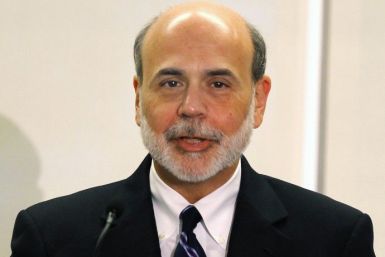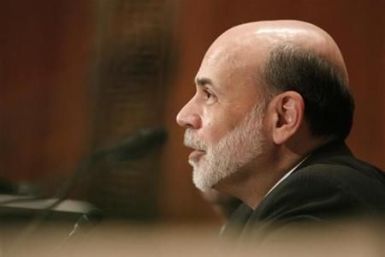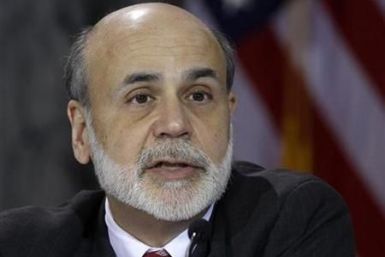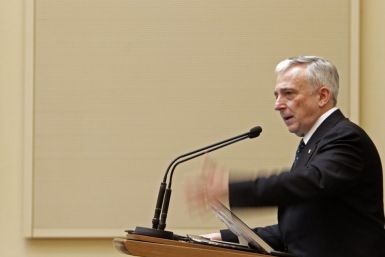Federal Reserve Chairman Ben Bernanke offered a fairly upbeat assessment of the U.S. economy on Tuesday, saying the recent surge in oil prices is unlikely to have a major effect on either growth or inflation, as long as higher prices do not become sustained.
Federal Reserve Chairman Ben Bernanke said both rounds of quantitative easing (QE1 and QE2) are working well, in the question and answer session of his testimony to Congress.
Federal Reserve Chairman Ben Bernanke remains unconcerned about inflation - perhaps rightly so - at a testimony in front of US lawmakers on Tuesday.
“We have seen increased evidence that a self-sustaining recovery in consumer and business spending may be taking hold,” said Federal Reserve Chairman Ben Bernanke in a testimony to Congress.
The recent surge in oil prices is unlikely to have a big impact on the U.S. economy, but could lead to weaker growth and higher inflation if sustained, Federal Reserve Chairman Ben Bernanke said on Tuesday.
Inflation in the eurozone rose from 2.3 percent in January to 2.4 percent in February year-on-year, according to the initial estimates by Eurostat.
Eurozone gross domestic product (GDP) will rise 1.6 percent this year, slightly above the previously forecast growth rate of 1.5 percent, the European Commission said in a report on Tuesday.
Manufacturing activity in the eurozone accelerated to a near 11-year high in February but input costs continued to rise, signaling inflationary pressures in the region.
Costs for Chinese and Indian factories jumped in February, pointing to a need for more measures to prevent inflation from undermining the world's two fastest-growing economies, surveys showed on Tuesday.
Federal Reserve Chairman Ben Bernanke will likely remain skeptical about the strength of the economic recovery in testimony on Tuesday, despite recent data pointing to improvement, signaling the central bank is unlikely to cut short its $600 billion stimulus plan.
India's budget belied expectations of cuts in fuel taxes on Monday, denying any relief to state-run oil firms but boosting chances of a planned ministerial meeting taking up the issue of raising prices soon.
Allianz Global Investment (AGI), the funds arm of one of Europe's largest insurers, see growth opportunities in China's burgeoning pensions market, where ageing residents are battling to fund their retirements.
Gold was little changed near $1,410 an ounce on Monday but notched its biggest monthly gain since August as chaos in Libya and rising tensions across the Middle East prompted investors to buy the metal as a safe haven. The US dollar lost its status and is at November lows.
East Asia's economy may need to slow to address inflationary pressures but the region will likely continue to lead the globe in economic activity, World Bank Chief Economist Justin Yifu Lin said on Monday.
A key Federal Reserve official said on Monday the economy can grow for a while before inflation pressures emerge and that policymakers should be wary of withdrawing their support for the economy too soon.
U.S. fund managers increased their exposure to alternatives in February as inflationary pressures intensified and slightly lowered their allocations in domestic equities, a Reuters poll showed on Monday.
The proportion of total gold demand accounted for by jewelry fell to just over 50 percent in 2009 from 75 percent in 2004. In the same period investment demand nearly tripled. But jewelry buyers still have a key role to play in the gold market, which they are likely to keep despite any slight fall-off in demand.
Gold rose to $1,413 an ounce in Europe on Monday as turmoil in the Middle East region lifted safe-haven buying and fueled a fresh spike in oil prices, stoking concerns over U.S. growth and knocking the dollar.
Despite a rise in inflation expectations caused by a flurry of positive economic data, the U.S. Federal Reserve may still not decide to tighten rates any time soon, according to an analyst.
Euro zone inflation was lower than initially estimated in January but still well above the European Central Bank's target and likely to rise further in February due mainly to more expensive oil.
Inflation in the eurozone was lower than initially estimated in January, but it still remained above the European Central Bank’s (ECB) target.
A 2.0 percent jump in Ugandan food prices in February from a month earlier helped drive the country's headline inflation rate higher for the fourth month in a row, the statistics office said on Monday.






























